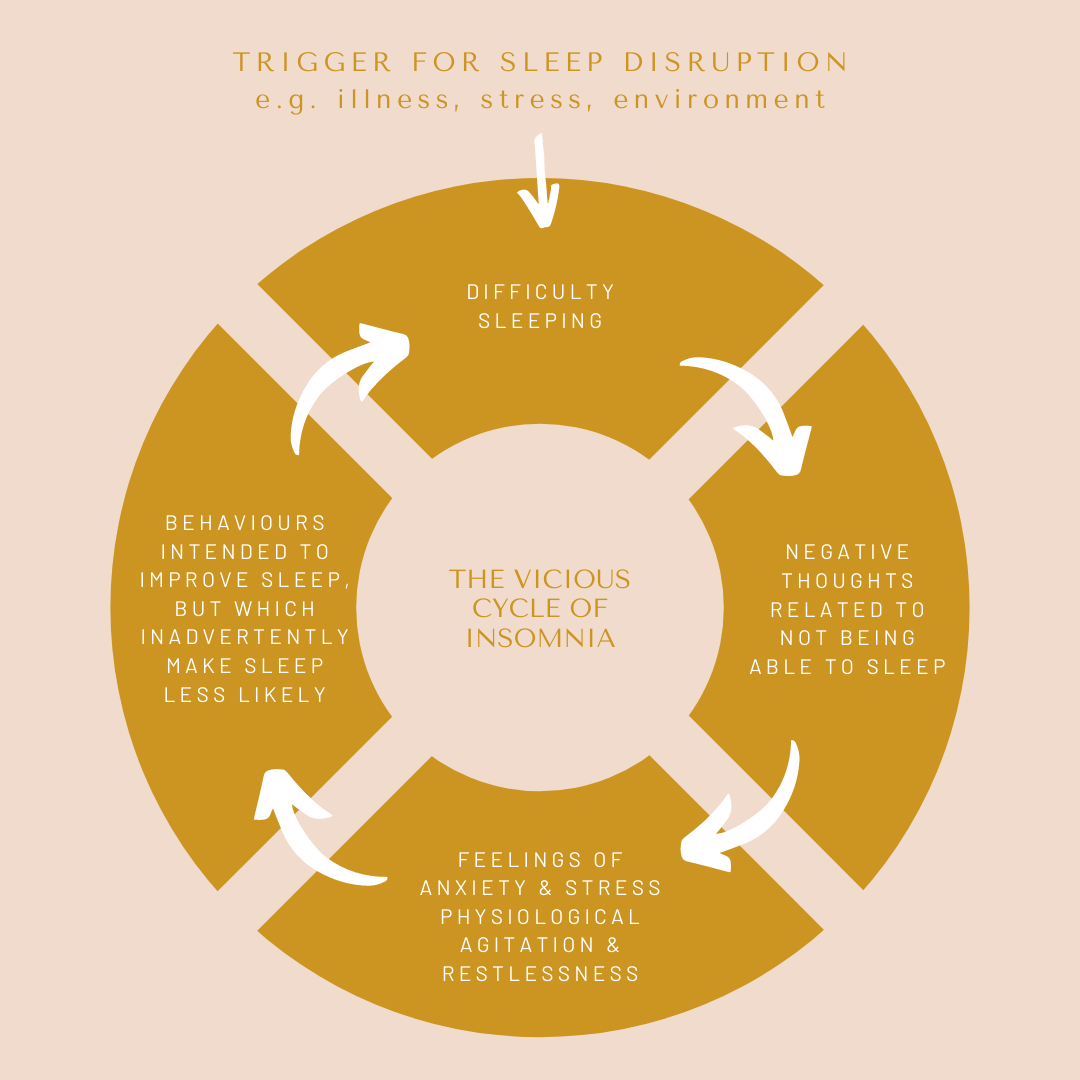Why Can’t I Sleep? Understanding Sleep Struggles
We all know that sleep is important, yet so many of us neglect it until it becomes problematic. Sleep is both psychologically and physiologically restorative. It is considered one of the four pillars of health, the foundations for good physical and emotional health and wellbeing.
WHAT IS SLEEP?
There are four stages of sleep in total, divided into two phases; Non-REM sleep and REM sleep.
Non-REM (non-rapid-eye-movement) sleep happens first and includes the first three stages of sleep. Non-REM sleep supports tissue growth and physiological repair and makes up around 75% of our sleep. Our deepest, most restorative, sleep (known as delta sleep) occurs during the latter two stages of Non-REM sleep. It’s hard to wake up from these deep stages of sleep.
REM (rapid-eye-movement) sleep, happens about ninety minutes after falling asleep. REM sleep restores mental function and cognitive performance, and provides energy to the brain and body. It occurs for about 25% of the night. REM sleep is when our dreams usually occur.
As we sleep, our body cycles through non-REM and REM sleep. Our sleep cycle, which takes around 90 to 110 minutes in total, usually starts with the three stages of non-REM sleep followed by a short period of REM sleep. Then the cycle begins again and continues throughout the night. As the night progresses we have longer periods of REM sleep and less deep non-REM sleep.
THE BENEFITS OF GOOD SLEEP
The many benefits of consistent good sleep include:
Energy restoration
Stress management
Mood regulation
Sharper memory & concentration
Improved work performance & productivity
Improved physical health & resilience
Growth & muscle repair
Faster recovery from illness or injury
Better relationships
WHY CAN’T I SLEEP?
Does your head ever hit the pillow & suddenly your brain wakes up?
This happens to us all from time-to-time but is more common if you're experiencing acute stress, anxiety, a loss or trauma or some form of physical pain, discomfort or illness. Whilst these factors may be responsible for the onset of sleep difficulties, it is often our negative thoughts about sleep, in addition to certain behaviours we do to try to address the problem, which are responsible for maintaining sleep difficulties, and can contribute to sleep disorders, such as insomnia.
The negative thinking that often accompanies difficulties falling asleep can result in anxiety, increased muscle tension, heart palpitations, shallow breathing and physiological restlessness. These have the knock on effect of making it even harder to fall asleep. We then sometimes engage in behaviours, intended to address the problem, but which actually, inadvertently, make the problem worse. For example, staying in bed "trying" to sleep, constantly checking the time, using our phone to alleviate boredom, or having daytime naps. These behaviours serve to maintain difficulties sleeping, and before long you can become stuck in a vicious cycle as illustrated in the graphic below.
THE IMPACT OF OUR THINKING ON SLEEP
“I need to be up in 4 hours" "I'm so tired I can't cope" "I'll never get to sleep"
Recognise any of these thoughts? The way we think about our sleep, or lack of it, significantly contributes to how well we do, or don't sleep. These four common thinking habits can disrupt our ability to sleep:
01 | Catastrophizing or assuming the worst about the meaning or cause of sleep problems. E.g. "I'll be so tired tomorrow I won't be able to cope" or "I've slept badly all week, I must have insomnia".
02 | Blaming everything that goes wrong in the day on lack of sleep, when there could be another explanation. E.g. "I'm only snappy with my partner because I haven't slept".
03 | Holding unrealistic expectations about how much sleep you actually need to function. Setting strict rules (e.g. I need 8 hours sleep) can lead to anxiety when this rule is broken.
04 | Extreme or "all or nothing" thinking. E.g. labelling a night's sleep as "good" or bad" without making space for it being "ok" or "good enough".
THE IMPACT OF OUR ACTIONS ON SLEEP
What do you do when you struggle to sleep? Sleep-related safety behaviours are behaviours which we use a) at night-time, due to a fear of disturbed sleep (e.g. staying in bed "trying" to fall asleep or checking the time), and/or b) during the day, as coping mechanisms following a night of disturbed sleep (e.g. drinking extra coffee or napping).
WANT to learn more about sleep?
If you struggle with sleep, or if you don’t but want to improve it, it's really worth taking a moment to reflect on what thinking or behavioural patterns could be impacting on your sleep.
If you found this useful, you may also like to read:
For more clinical psychology strategies and resources, sign up to my fortnightly newsletter, Unfrazzled, your go-to source for refuge in the chaos. Each edition curates a blend of psychological insights, practical tips, and inspiration to help you untangle the knots of modern life ⋒




